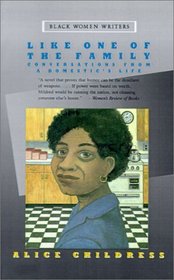Originally published as a serial in African-American papers in the 1950s this series of monologue-style short stories are all in the voice of Mildred--a daytime maid for white families in New York City. The monologues are all addressed to her best friend and downstairs neighbor, Marge, who is also a maid. The stories range from encounters with southern relatives of moderately minded employers to picnics threatened by the Ku Klux Klan to more everyday occurrences such as a dance that went bad and missing your boyfriend. Mildred's spitfire personality comes through clearly throughout each entry.
Through Mildred Childress addresses the issues of the day via deftly handled everyday situations. She is particularly adept at demonstrating how a segregated, racist society causes both black and white people to regard each other with undue suspicion in spite of being in everyday close contact with each other.
Of course sometimes reading Mildred's life all at once instead of periodically as it was intended was a bit desensitizing. Although Mildred had every right to be upset in each situation related, I found myself noticing more and more that Mildred was simply a character for Childress to espouse her views upon the world with. I quickly checked myself from getting bugged by that, though. Of course Childress had every right to be upset and did not originally intend this to be a book of Mildred's life. Mildred was a vehicle through which to discuss current issues highly relevant to the readers of the paper. It is important in reading historic work to always keep context in mind.
Overall this is an interesting collection that reveals the real life situations black domestic workers of the time period found themselves in.
Check out my full review. (Link will be live on November 12th).
Through Mildred Childress addresses the issues of the day via deftly handled everyday situations. She is particularly adept at demonstrating how a segregated, racist society causes both black and white people to regard each other with undue suspicion in spite of being in everyday close contact with each other.
Of course sometimes reading Mildred's life all at once instead of periodically as it was intended was a bit desensitizing. Although Mildred had every right to be upset in each situation related, I found myself noticing more and more that Mildred was simply a character for Childress to espouse her views upon the world with. I quickly checked myself from getting bugged by that, though. Of course Childress had every right to be upset and did not originally intend this to be a book of Mildred's life. Mildred was a vehicle through which to discuss current issues highly relevant to the readers of the paper. It is important in reading historic work to always keep context in mind.
Overall this is an interesting collection that reveals the real life situations black domestic workers of the time period found themselves in.
Check out my full review. (Link will be live on November 12th).




